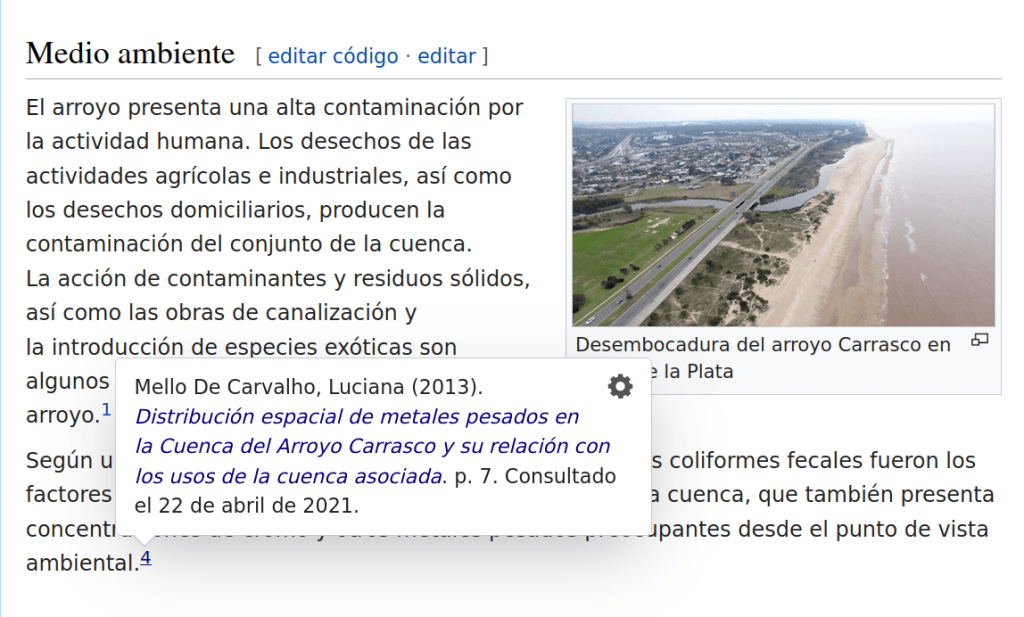
Open access to scientific research is a fundamental requirement to guarantee the human right to share in scientific advancement and its benefits. Wikipedia is a key tool to promote this right, since it allows the collaborative dissemination of scientific knowledge. Wikipedia articles are written from reliable sources and contain multiple references to them. As explained in a post by Miriam Redi and collaborators:
Citations are the foundation of Wikipedia’s reliability: they trace the connection between content added by our community of volunteer contributors and its sources. For readers, citations provide a mechanism to validate and check for themselves that what Wikipedia says is sound and trustworthy: they act as a gateway towards a broader ecosystem of reliable knowledge.
Wikipedia relies on all kinds of sources, including sources whose access is restricted by a paywall. However, open access scientific sources are especially important. Since they do not require payment to access, they are immediately verifiable by a wider number of Wikipedia editors and readers.
In recent years, numerous universities have been building open access academic repositories. These repositories collect the scientific works of their students, teachers and researchers. One example is the Colibrí repository of the University of the Republic. Colibrí is the most important initiative of open access to scientific research in Uruguay. As of today, it contains more than 25,000 items, most of which are academic papers.
But, how much is the Colibrí repository used as a source in Spanish Wikipedia? To answer this question, I used Wikipedia’s external links search tool. I looked for both direct links to the Colibrí website and links to Colibrí articles in the Handle.Net registry.
The results indicate that Colibrí is rarely used to include citations in Wikipedia articles. As of June 2021, there are only 56 external links to papers from the Colibrí repository in the almost 1,700,000 Wikipedia articles in Spanish, including the direct links to the Colibrí repository and its articles in the Handle.Net registry.
In English Wikipedia, usage is even lower. Lost among the more than 6 million articles in the encyclopedia, there are only 15 links to Colibrí papers, including those that lead directly to the repository and those that lead to Colibrí articles in the Handle.Net registry.
Taking into account the potential of Colibrí as a source for citations in Wikipedia articles, it is clear that this and other open access academic repositories need to be further disseminated among Wikipedians. This is especially evident given the variety of articles that use citations from Colibrí: geographic locations, animal species, biographies of people, political highlights, unions, national laws, indigenous languages, and even general articles of all kinds, not necessarily referring to local aspects of Uruguay. Campaigns such as #1Lib1Ref –and its Spanish version #1bib1ref– are essential to involve librarians, who are experts in academic repositories, in the editing of Wikipedia. In addition, these types of campaigns help the rest of the Wikipedians discover repositories and use them more often when creating and improving Wikipedia articles on the most diverse topics.
Complementary to this, a reflection is needed on the low level of involvement of researchers in open and collaborative projects such as Wikipedia. It is necessary to continue explaining the potential of Wikipedia for the dissemination of scientific knowledge and to promote that the people who participate in the scientific community are encouraged to edit Wikipedia by adding citations. Some important strategies to promote this objective are workshops and tutorials for authors of scientific research. It is also worth evaluating to what extent it is possible to design experiences similar to #1Lib1Ref oriented, in this case, to researchers. As Evelin Heidel states in a recent post on this topic:
Scientific publications need Wikipedia and Wikipedia needs scientific publications.
This means that only mutual gains can be expected from a more developed relationship between Wikipedia and the scientific community. Wikipedia content will better reflect the state of the art, while scientific works will gain relevance, as they will serve to allow more people to access and share in scientific advancement.

Can you help us translate this article?
In order for this article to reach as many people as possible we would like your help. Can you translate this article to get the message out?
Start translation